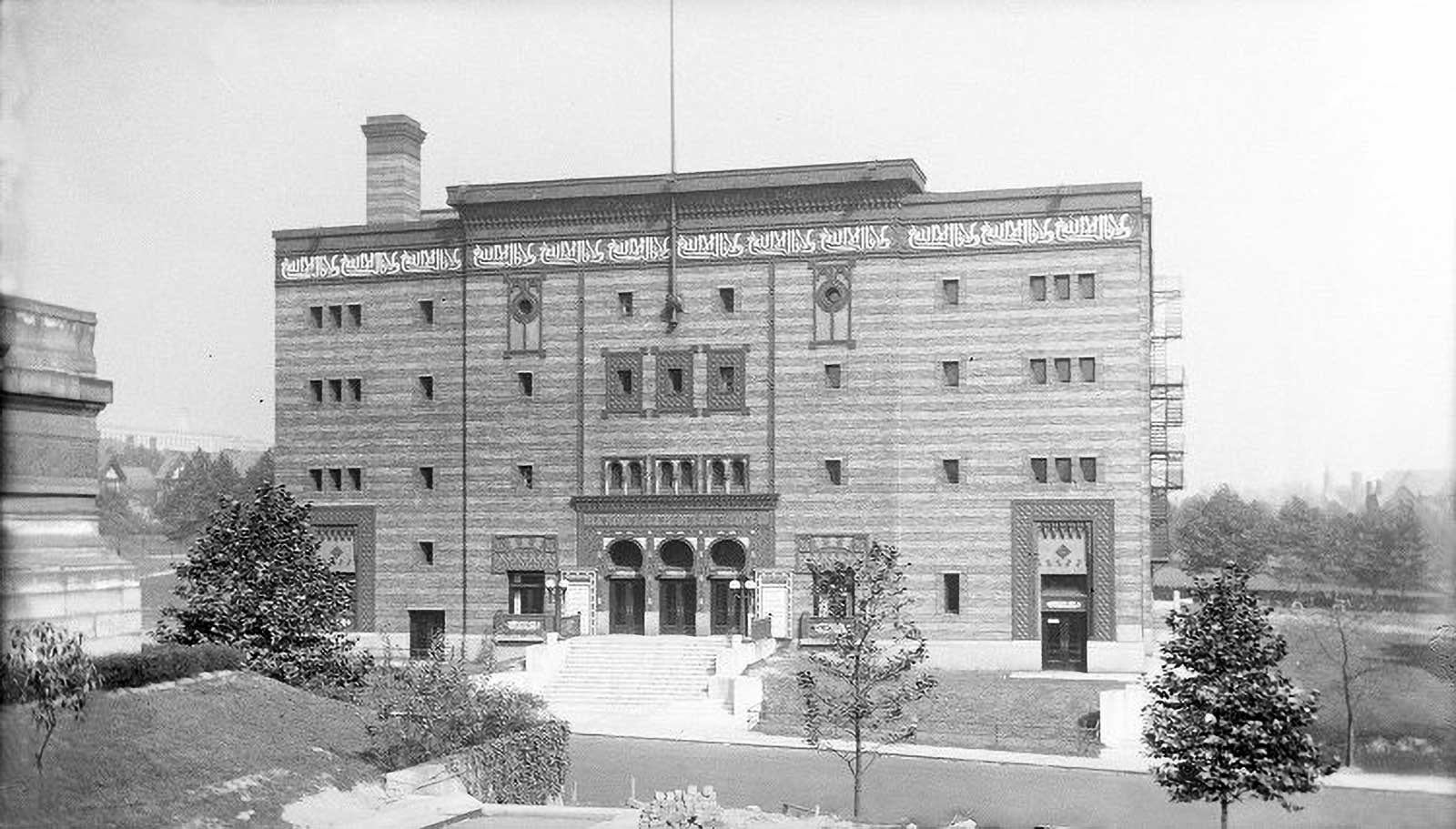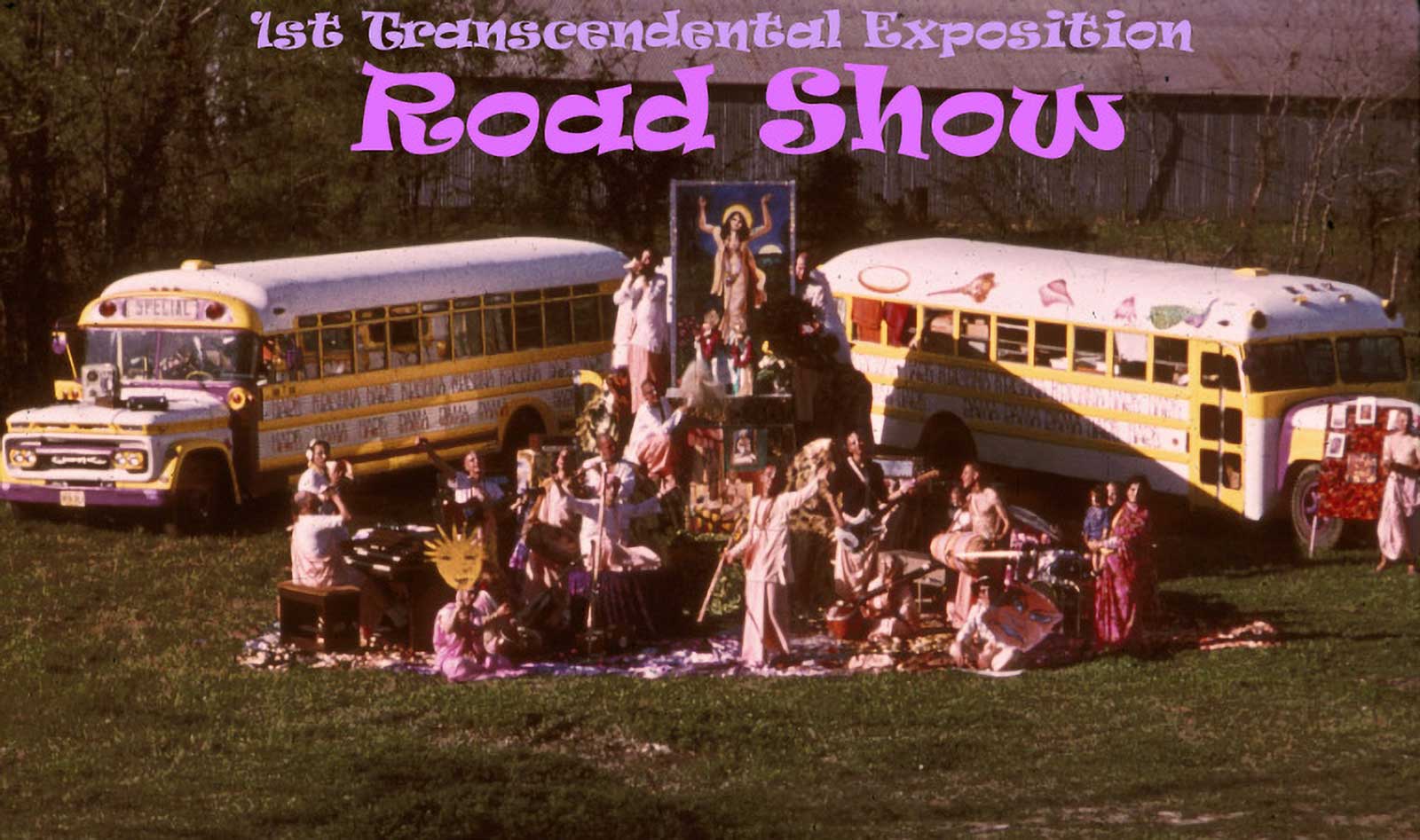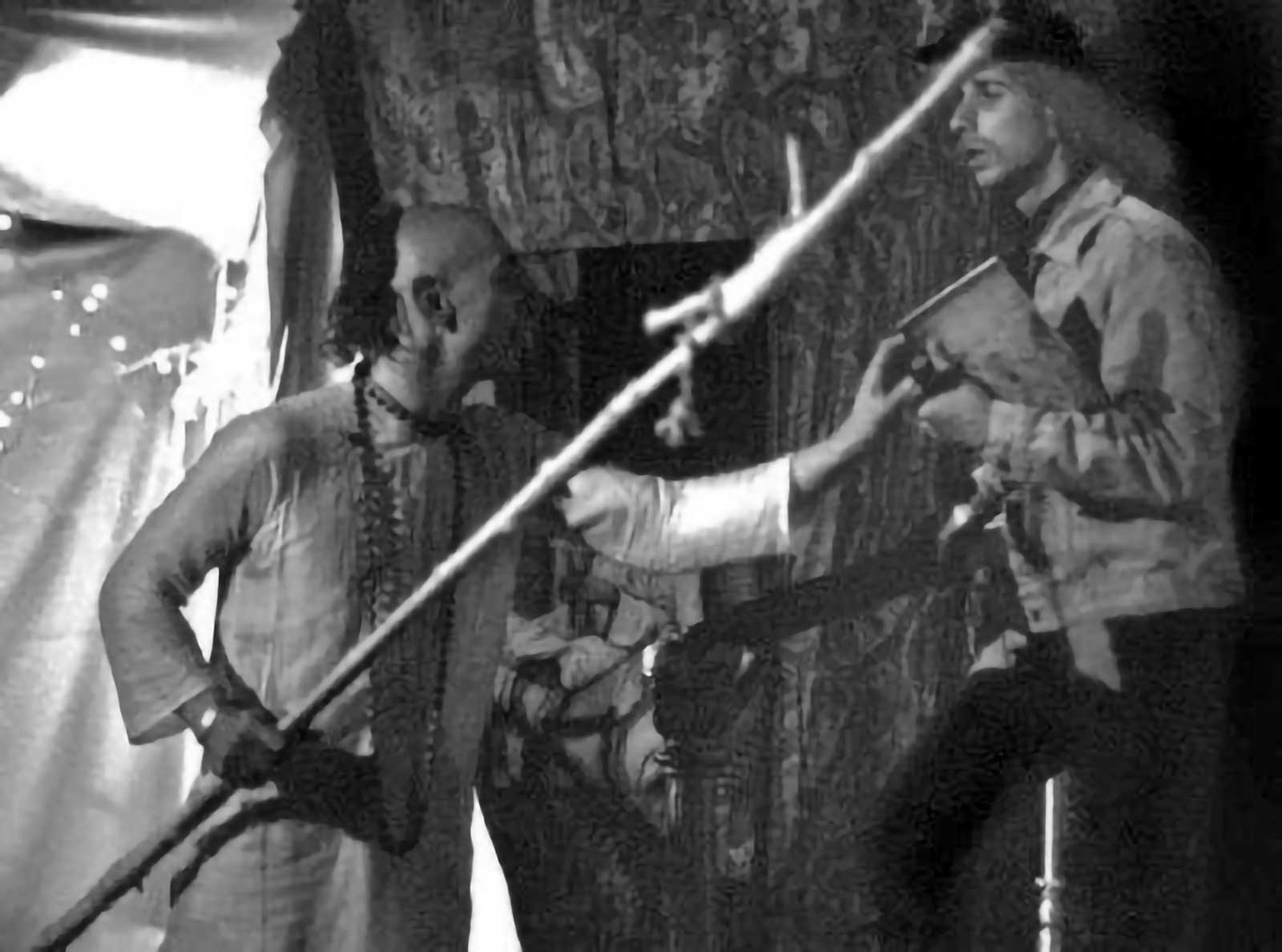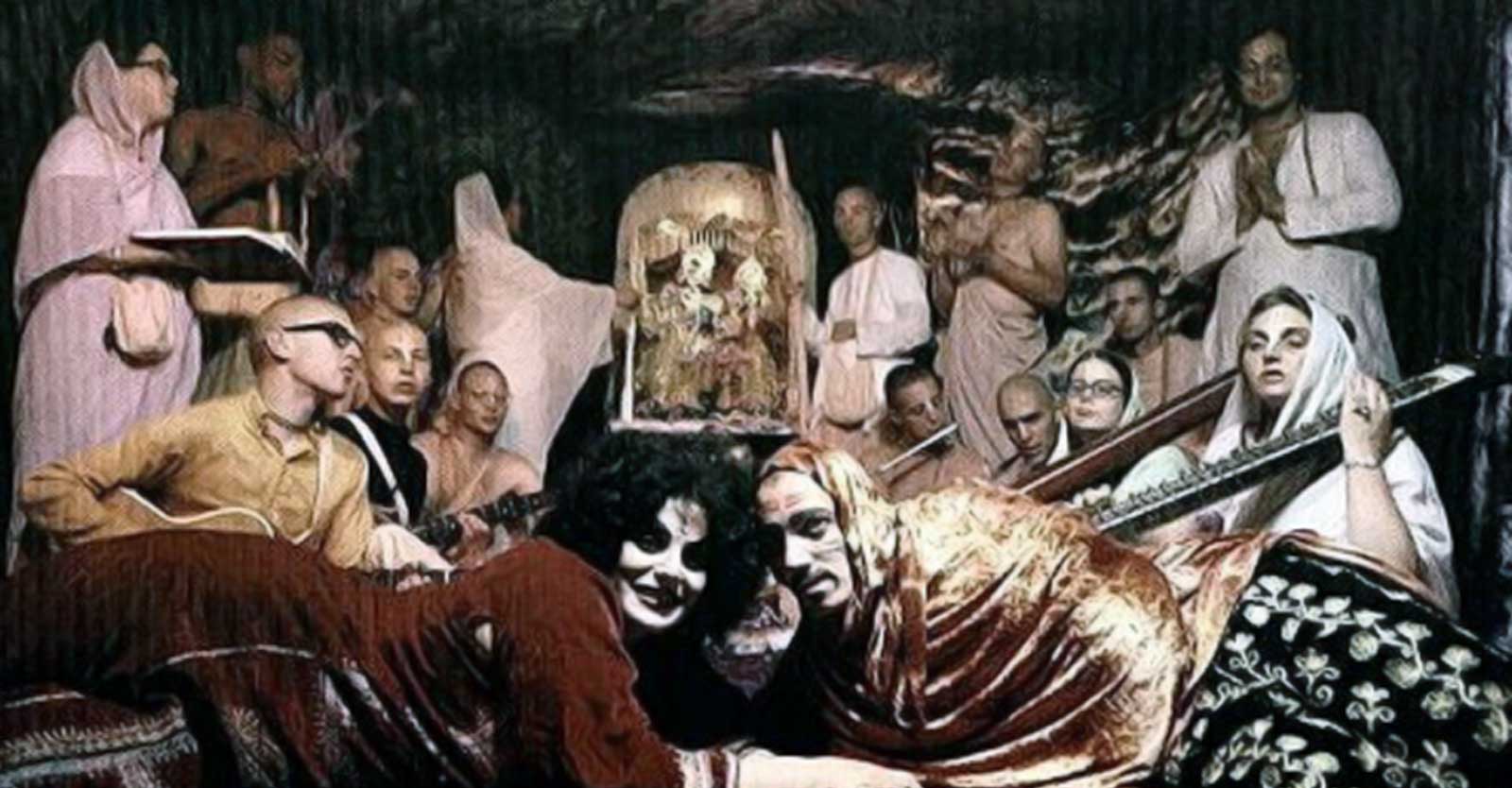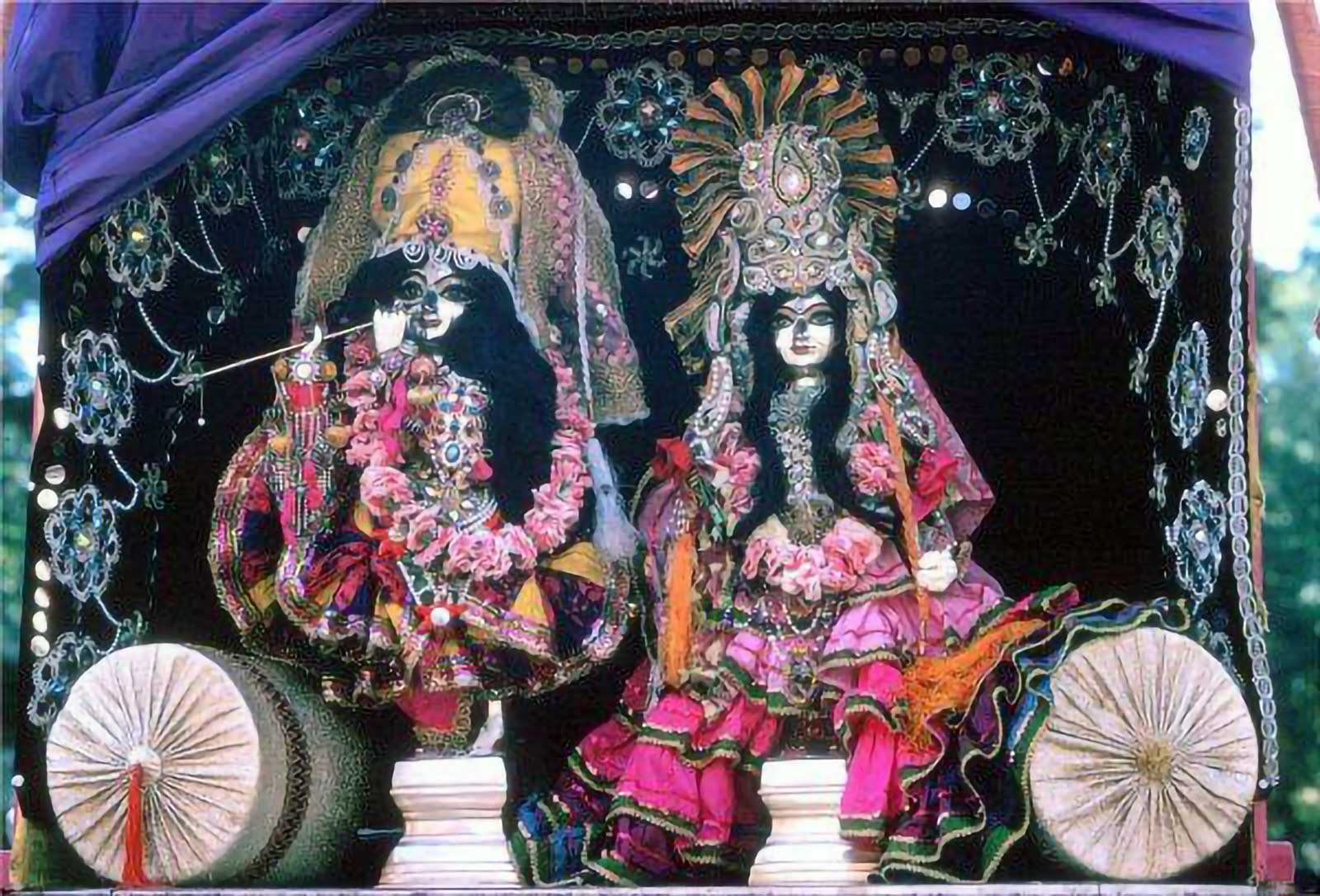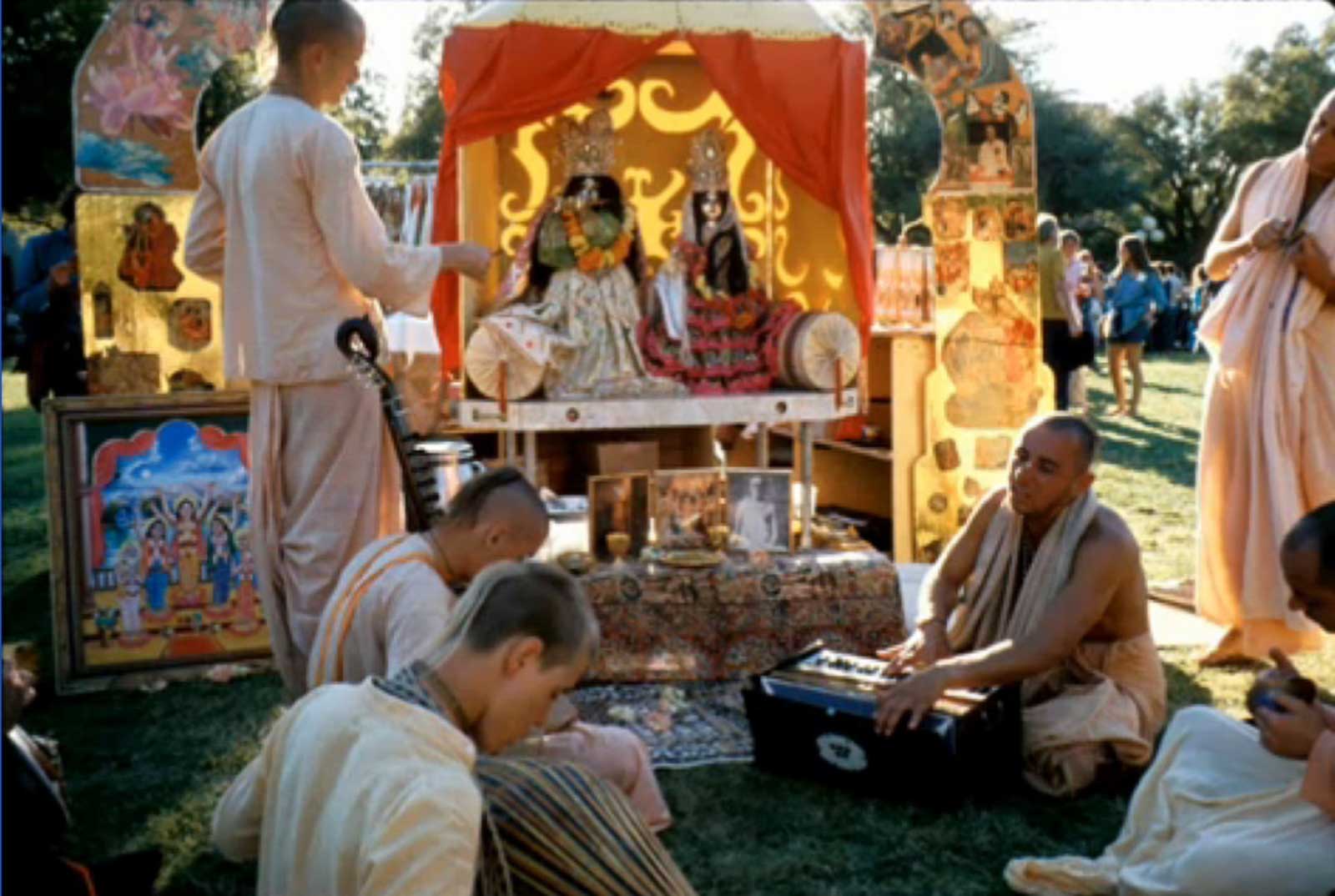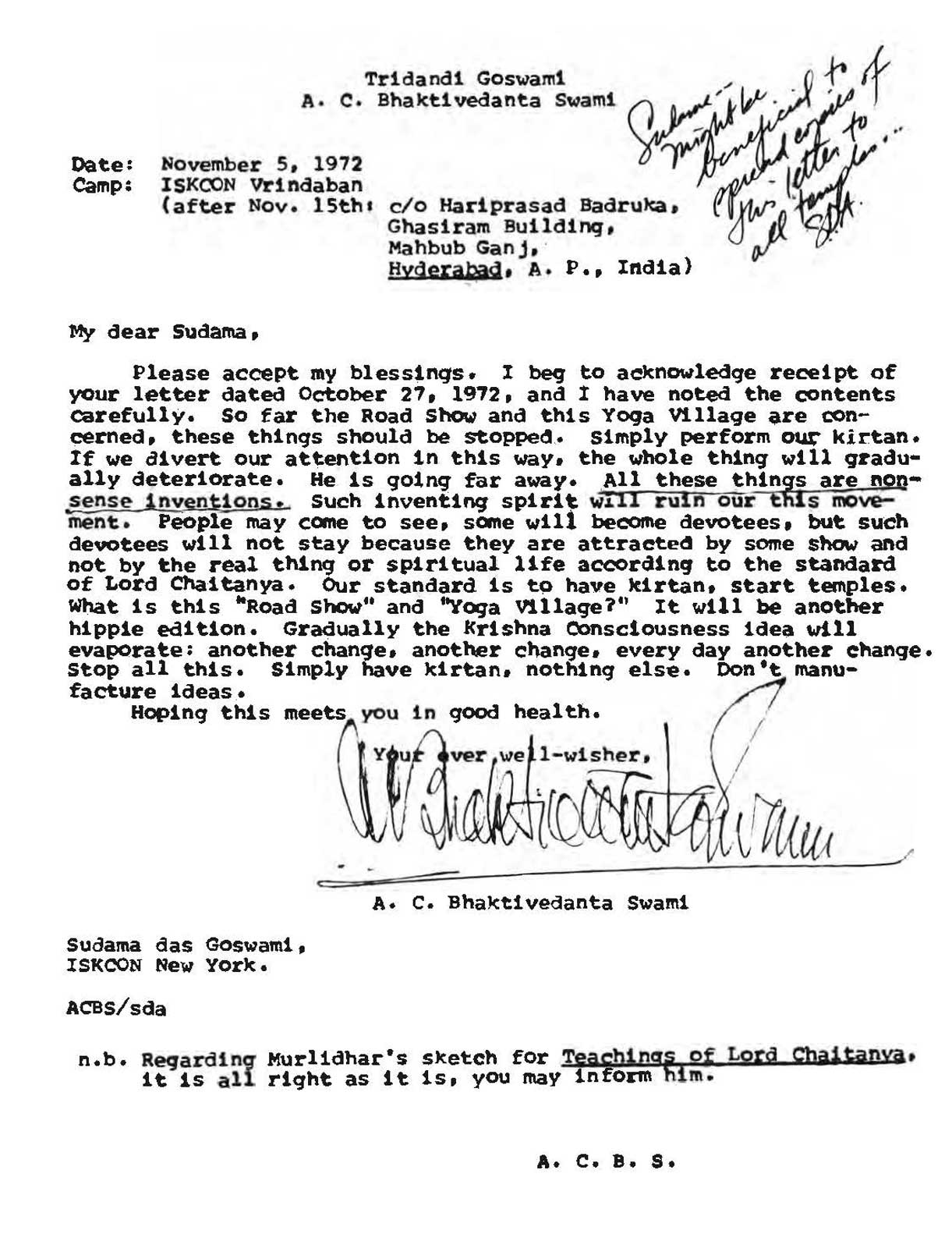Ācārya Siṁha
The Life of Swami Bhakti Gaurava Narasiṅgha Mahārāja
Chapter 13 – Viṣṇujana Swami and the Rādhā-Dāmodara Party
(Pittsburgh, New York and Daytona Beach – 1972-1973)
“Well, what do you want to do?”
Sitting alone with Viṣṇujana Swami on the grass at New Vṛndāvana, Narasiṅgha Mahārāja explained his present situation – how only ten minutes ago he had been removed from the Denver saṅkīrtana party and was now without any service and did not belong to any particular temple. He didn’t have to think twice to reply to Viṣṇujana’s question.
“I’m a book distributor. I want to worship Rādhā-Dāmodara in the morning and sell books all day long!”
Hearing this response Viṣṇujana beamed widely and shouted, “Jaya!”
Thus, after a two-minute interview, Mahārāja became an official member of Viṣṇujana Swami’s Rādhā-Dāmodara Party.
Mahārāja dutifully handed over the keys of his saṅkīrtana van to Śrī Vallabha from the Denver temple, but when Śrī Vallabha heard that Mahārāja was joining Viṣṇujana’s saṅkīrtana party, he refused to take the keys – instead, he also decided to mutiny and come with him.
Narasiṅgha Mahārāja: It had already been on my mind for a long time. From the first time I saw Viṣṇujana Swami in L.A., I was inspired by him and was hankering for his association. I had to bloop from Denver (or get kicked out) to get onto Viṣṇujana’s party. One side condemns, the other side welcomes…
Twenty minutes later, Viṣṇujana Swami and his party pulled out of New Vṛndāvana and drove for an hour to Pittsburgh. Śrīla Prabhupāda was already there waiting for Viṣṇujana to return. Viṣnujana wanted to show Prabhupāda his ‘Transcendental Rock Opera.’ and that evening the performance was at the prestigious Syria Mosque (which was not actually a mosque, but was called so because it was designed with arabesque features). Over the months, Viṣṇujana’s masterpiece had grown exponentially – there were more scenes, more songs, the props and costumes had increased, and after the show was over, it took half the night for the devotees to dismantle everything and pack it all away.
(The Syria Mosque and Viṣṇujana Swami’s ‘Transcendental Road Show’)
When Śrīla Prabhupāda arrived at the Syria Mosque that evening with some of his leading disciples, Narasiṅgha Mahārāja was stationed outside, distributing books.
Narasiṅgha Mahārāja: When Śrīla Prabhupāda arrived with Puṣṭa-Kṛṣṇa Swami, Pradyumna Prabhu and others, I was outside selling books. In fact, every night that the Road Show, or the Light Show, as we called it, was playing, I was always outside with books – so I never actually got to see it. I remember the night that Prabupāda came, the event was packed out. I think we must have sold hundreds of books that night, maybe even a thousand.
(Viṣṇujana Swami’s ‘Transcendental Roadshow’, 1972)
The show went on for a few more weeks, during which time, Mahārāja and the other brahmacārīs took full advantage of Viṣṇujana Swami’s association. When Viṣṇujana would take prasādam, they would take prasādam; when Viṣṇujana would take rest, they would take rest. When they were not distributing books, the brahmacāris would spend their time doing kīrtana with Viṣṇujana in front of Rādhā-Dāmodara.
Narasiṅgha Mahārāja: I remember how Viṣṇujana would sing sitting down before the ārati in front of the Deity curtain and just pump the harmonium, singing, “Govindam ādi-puruṣaṁ tam ahaṁ bhajāmi” over and over. Before the curtain would open, you’d almost be in tears. He would create such a wonderful mood. I’m sure that sound is deep in the hearts of many devotees.
Although it was unusual to have Rādhā-Kṛṣṇa as travelling saṅkīrtana Deities, Śrīla Prabupāda had given special permission to Viṣṇujana Swami to travel with Rādhā-Dāmodara, but warned him to be careful since the standard of worshiping Rādhā-Kṛṣṇa was very high. But at the same time, he said that Rādhā-Dāmodara were ‘acting as Lord Caitanya.’
(Rādhā-Dāmodara and the Rādhā-Dāmodara saṅkīrtana party )
Mahārāja would go out with a saṅkīrtana party for book distribution, and then meet up with Viṣṇujana at the next Road Show destination. In late October, Mahārāja went with Viṣṇujana Swami to the New York temple to pick up books and plan their next rendezvous.
Narasiṅgha Mahārāja: I told Viṣnujana that I planned to distribute some books in Upstate New York because we had a tip on a good university and I would rendezvous with him in Atlanta. So we went to that university and it was so hot for book distribution that we sold all our books in a couple of days and I had to drive back to New York and get more. Although we were officially Viṣṇujana’s Rādhā-Dāmodara Party, we also got the New York devotees involved because it was such a big opportunity. But before I left New York after picking up more books, I was told to also take all their lady book distributors with me. The ladies’ party was headed by one famous artist who seemed way too eager to tell me over and over how she had always wanted to do book distribution with me! Anyhow, by the second day, they were driving me nuts! They were always trying to get the attention of the brahmacārīs. Luckily, New York eventually sent a van and the driver was a gṛhastha, so after most of the books had been distributed, I put him in charge of the ladies’ party, took my brahmacārīs and left.
Mahārāja was supposed to meet Viṣṇujana Swami in Atlanta where he was planning another project called the ‘Yoga Village.” Before that, Mahārāja had been told by him to go to the New York temple, pick up some more books and try and ‘kidnap’ a few more brahmacārīs from the temple for the Rādhā-Dāmodara Party. However, there was some big news waiting for Mahārāja in New York that would change everything.
Although initially, Śrīla Prabhupāda had appreciated the efforts of Viṣṇujana Swami and the devotees who were working hard to make the Road Show a success, Prabhupāda had suddenly decided to disband it. Writing from Vṛndāvana, Śrīla Prabhupāda explained why:
So far the Road Show and this Yoga Village are concerned, these things should be stopped. Simply perform our kirtan. If we divert our attention in this way, the whole thing will gradually deteriorate. He is going far away. All these things are nonsense inventions. Such inventing spirit will ruin this movement. People may come to see, some will become devotees, but such devotees will not stay because they are attracted by some show and not by the real thing or spiritual life according to the standard of Lord Chaitanya… Our standard is to have kirtan and start temples. What is this “Road Show” and “Yoga Village?” It will be another hippie edition. Gradually the Krishna consciousness idea will evaporate: another change, another change, every day another change. Stop all this. Simply have kirtan, nothing else. Don’t manufacture ideas. (Letter to Sudama, November 5th, 1972)
Armed with Śrīla Prabhupāda’s letter, the New York Temple president, Bali-mardana Swami, called Narasiṅgha Mahārāja into his office and sat him down.
Narasingha Maharaja: I had a feeling something was up when he called me in, but I had no idea what it was. I paid my obeisances and then he said, “Do you know that Prabhupāda has cancelled the Road Show?”
I was shocked, “What do you mean?”
“It’s right here in this letter to Sudama.” Then he showed me the letter and I read it.
(Prabhupāda’s letter to Sudama cancelling the Roadshow, Nov. 1972)
In hindsight, Narasiṅgha Mahārāja had also noticed that things behind the scenes of the Road Show were not exactly compatible with the life of a brahmacārī. Fortunately, the saṅkīrtana devotees were always outside the venues distributing books, or on the move – but backstage there was a lot of close mixing amongst the men and women, and although everyone was trying to be as strict as possible, attending the morning program, chanting their rounds etc, māyā was always not too far behind. It was an accident waiting to happen.
Narasiṅgha Mahārāja: The day after Prabhupāda had attended the show, they told him how many people came and how many books went out, and he commented that this was Lord Caitanya’s special mercy. But then a few weeks later, he disbanded the whole project because they were all becoming like Jimmy Hendrix. They all got captured. They were trying to use the music to capture those people, but the music captured them. This is what happens time and time again in the Hare Kṛṣṇa music scene, whether it’s sitar, drums, ukulele – the music always captures the devotees. It has always been a dangerous field. Getting more into their music then they are into Kṛṣṇa, so these things keep getting attempted and reinvented, but they are a danger. When you take up rock music to preach, you are in a war zone, and you may perish. That music may attract people but it may corrupt you.
As if the news of the Road Show being dissolved wasn’t bad enough, Bali-mardana had another bombshell to drop on Mahārāja’s head…
Narasiṅgha Mahārāja: I finished reading Prabhupāda’s letter, then Bali-mardana told me that the Rādhā-Dāmodara Party was over. “So now, are you going to follow this renegade, Viṣṇujana and his party who have displeased His Divine Grace, or are you going to follow Śrīla Prabhupāda?”
I was like, ‘Well, if you put it that way…”
“Yeah, I AM putting it that way!” Bali-mardana replied.
“Prabhupāda of course.”
Then Bali-mardana said, “Okay, then following Prabhupāda means surrendering everything here, to the New York temple – your men, your books, your money and your van.”
Then he picked my brain about the van, asked where it was registered, where the papers for it were etc, and after I told him, he said, “Okay, so now give me the keys to your saṅkīrtana vehicle!”
So I went outside, called the men, told them that there had been a letter from Prabhupāda and that the Road Show and the Rādhā-Dāmodara Party was over. Then Bali-mardana took my vehicle, took my men, took our collect and grounded us. Anyhow, the nice thing was that after we handed everything over to him, Bali-mardana brought us the entire mahā-prasāda lunch offering of Rādhā-Govinda – and that was the most awesome mahā-prasādam outside of India! And while we were sitting there relishing it, he said, “This is just the beginning, boys. If you sell books for Rādhā-Govinda, there are perks!
Thus, in a strange twist of fate, Mahārāja had originally come to the New York temple to steal devotees for Viṣṇujana’s saṅkīrtana party, but it was Mahārāja and Viṣṇujana’s saṅkīrtana party that were stolen by the New York temple!
Mahārāja knew that his sudden defection to New York would anger Viṣṇujana Swami, but by showing him Prabhupāda’s letter, and asking where his loyalties lay, Bali-mardana had put him in a bind. And besides, Bali-mardana had told him that the Rādhā-Dāmodara Party was now history!
Narasiṅgha Mahārāja: Bali-mardana was a sannyāsī at the time, and the movement didn’t have many sannyāsīs then. He had the authority and a sort of charisma. It was pretty incredible that we were all so willing to accept authority – it was very rare for our generation.
But the way that Bali-mardana had explained things to me was that the Rādhā-Dāmodara Party was over! He put me on the spot and basically fuddled my brain and worded things in such a way that I thought that Viṣṇujana was the biggest deviant on the planet. He took advantage of my immaturity and basically used my loyalty to Śrīla Prabhupāda to steal our saṅkīrtana party.
Whatever the case, Mahārāja could only hope that he wouldn’t bump into Viṣṇujana Swami any time too soon…
As any saṅkīrtana devotee can attest to, distributing books is a challenge anywhere and New York was certainly no exception. In December, devotees not only had to fend off the biting cold of the East Coast, but also the NYPD who were intent on arresting them for any number of felonies such as trespassing, obstruction, selling without a permit etc. Eventually, Mahārāja came up with a plan to evade the law.
Narasiṅgha Mahārāja: We were in the New York temple watching Nayanābhirāma and his troupe doing a drama for the Sunday feast. I couldn’t recognise any of the devotees because they were all wearing wigs and that’s when it hit me! After the drama was over, I went to the room where Nayanābhirāma stored all the costumes and I stole a wig. It was a brown ladies’ wig and I put it on and made a pony tail at the back with a rubber band. Then I went out and as I was walking down the corridor, I heard one devotee named Janārdana (now B.V. Vaikhānasa Mahārāja) call out, “Hey! Excuse me, you can’t go that way!”
I just kept walking and Janārdana kept calling out until he came up right behind me. Then I turned round and said, “Good, eh?” Janārdana was stunned. Then I told him my plan and we stole another wig and both went out on saṅkīrtana the next day.
We went to a mall dressed in shirts and pants to sell books, and as soon as we entered, I spotted a policeman, so I walked straight up to him and asked where the sports shop was. He gave me directions, I thanked him, then I walked away – at that point I knew that it had worked! The wigs were basically to cheat the cops who kept arresting us, not to cheat the public. Anyhow overnight, wigs became a huge hit with all the saṅkīrtana devotees – it spread like a wildfire in a Californian forest! Soon, with the exception of Śrīla Prabhupāda, everyone in the movement had a wig, I heard that when Prabhupāda heard about our trick, he laughed and gave the example of Arjuna dressing up as a sannyāsī to kidnap Subhadrā.
We weren’t the first devotees to wear wigs – that was Siddha-svarūpa and Gaurasundara in Hawaii. They had infiltrated the Anandamayi Ashram and after three days of preaching to the inmates there, they managed to empty the whole āśrama and make everyone bloop! But I think that me and Janārdana were the first devotees to go out on saṅkīrtana wearing wigs.
Bali-mardana was encouraging all the devotees in New York to collect as much money as possible. Śrīla Prabhupāda had his eyes set on purchasing a twelve-storey building which was for sale. It was at a prime location in Manhattan on West 55th Street and used to be a hospital. New York was one of the most important cities in the United States, and if the devotees could buy that property, it would be a great asset for the Kṛṣṇa consciousness movement. Prabhupāda told Bali-mardana, “Beg, borrow, or steal, but get that building in New York!”
(The Manhattan Temple after it was purchased)
Narasiṅgha Mahārāja: Prabhupāda had said, “Beg, borrow, or steal.” Well, ‘beg’ – we were already doing that on the streets; ‘Borrow’ – that was up to the temple authorities; and ‘steal’…?
So I came to Bali-mardana with a plan how we could rob a bank! I gave him all the details how we could pull off a heist, or at least rob people when they came out of the banks after withdrawing their cash. After listening to me, he shook his head and said, “You’re crazy! Get out of here! Go out and sell flowers on the street!” What to do? I was very young and fanatical at the time…
It wasn’t long before Bali-mardana came up with the idea of sending the saṅkīrtana devotees out to collect money for ‘feeding Bangladeshi refugees in India.’ Mahārāja and the devotees would go to the subways with a photo book showing prasādam distribution in Māyāpura, and a wooden cigar box for people to put their donations in. In this way, they collected a sizeable amount of money. However, by the end of the month, Bali-mardana received a letter from Śrīla Prabhupāda, who had mixed feelings about his collection tactics:
Of course, we may take money for Kṛṣṇa using any method of beg, borrow and steal, but more advanced understanding of Kṛṣṇa consciousness process is that by telling the truth in a very palatable way, that is the most successful system. Your mentioning Bangladesh feeding of refugees, of course we are feeding sometimes the local inhabitants, up to 1,000 persons on some occasions, but there is no organized program of feeding the refugees at Māyāpura. In fact, so far I have seen, all the refugees from Nadia District have gone back to Bangladesh, there are no more refugee camps. So it will not be the truth to say to people like that, but I have no objection if they give more hearing such thing. Let them say, who will check us? We may tell any damn thing to induce people to give us money on Kṛṣṇa’s behalf, that is not the point. The point is that by saying lies, the less advanced neophyte devotees may become entangled or disturbed in their minds by it. Of course, by their collecting more money and giving to Kṛṣṇa, He will relieve them of all anxiety of telling lies. But not everyone is able to catch the big fish without themselves becoming wet. I am convinced that if you simply glorify Kṛṣṇa and our books in the best descriptive manner, that anyone and everyone, no matter even atheist or otherwise, they can be convinced to purchase. Of course, that is a great art and not everyone can do it, but gradually by practice of preaching in this way, striving to so much present a wonderful picture of our books to the people, gradually you will master the trick how to do it. Being the senior devotee there, you may give the younger students all good instruction and advice how to do this, but not for any reason shall we decrease the book sales and collection monthly over some small lying about Bangladesh or other things. (Letter to Bali-mardana, December 31st, 1972)
It was common for the temple authorities to share certain letters from Śrīla Prabhupāda by posting them on the temple noticeboard for the devotees to read. But this letter was not shared with them.
However, one morning, Mahārāja and some of the brahmacārīs were walking past the noticeboard when they saw a new letter from Prabhupāda. There had recently been some controversy concerning a particular devotee in Hawaii who, although he was a disciple of Prabhupāda, had amassed quite a loyal following. Some of them had begun to propagate that only he and Śrīla Prabhupāda were pure devotees, and this had become an issue within the movement. Prabhupāda had written to one of these followers that it was not only this person who was a pure devotee. Śrīla Prabhupāda wrote, “All of my disciples are pure devotees. Anyone sincerely serving the spiritual master is a pure devotee.”
Narasiṅgha Mahārāja: There were four or five of us standing there, reading this letter. Then we just looked at each other and didn’t know what to say. Prabhupāda had written that all of us were pure devotees and we were like, “Er…what does that mean?” One of the devotees asked, “How can that be?” Another said, “Well, I’m not a pure devotee!”
Now, as neophyte as I may have been then, I had explicit faith in anything Śrīla Prabhupāda said, and I was able to connect the dots, so I replied, “What do you call a person who works in a coal mine?”
“A coal miner”
“What do you call a person who cooks food?”
“A cook”
“So what do you call a person who follows pure devotional service?”
“A pure devotee!”
“Then? Pure devotee doesn’t necessarily mean one has love of God yet. There are different gradations of pure devotees, but one who is following pure devotion strictly is considered to be a pure devotee.
Initially, Bali-mardana had told Narasiṅgha Mahārāja that Viṣṇujana’s Rādhā-Dāmodara Party was going to be disbanded, but Mahārāja was getting reports that the party was still going strong and preaching up a storm in Atlanta. Hearing of the party’s successes on book distribution, Mahārāja realised that he had been hoodwinked. After collecting in New York for four months, Mahārāja decided to take his saṅkīrtana party to Daytona Beach in Florida during the spring break.
Narasiṅgha Mahārāja: I was fried with Bali-mardana. I didn’t ask him – I TOLD him that I was going to Daytona Beach. So I commandeered a saṅkīrtana van, some brahmacārīs and a bunch of books and we drove down to Florida for the spring break in April. We were going to do saṅkīrtana on the beach, so we had gone out and bought these big bushel baskets of oranges from the orange groves – we chopped them all up, put them on ice and we took the side doors off our van so we could distribute them from our vehicle. We were driving up and down the beach doing kīrtana, giving out cold orange slices and distributing books. There were hundreds and thousands of college kids there and saṅkīrtana was really successful.
In fact, preaching at Daytona was so successful that Mahārāja decided to break away from the clutches of Bali-mardana in New York and open a preaching centre there. He drove around Daytona Beach for a few days with a new devotee named Bhakta Daniel (who later became Śravaṇānanda Dāsa) looking at properties to rent and finally called the New York temple to break the news to Bali-mardana.
Narasiṅgha Mahārāja: I called from a payphone to give Bali-mardana the word that I was deserting, and I would send him some money and pay for the van, but another devotee, Toṣaṇa-Kṛṣna, picked up the phone. So I gave him the news and asked him to tell Bali-mardana.
He said, “Yeah, okay, I’ll tell Bali-mardana…but it’s a shame you’re gonna miss it.”
“Miss what?”
“Well, Prabhupāda just arrived yesterday morning.
“What? Prabhupāda’s there in New York?”
“Yeah, he’s upstairs talking to Bali-mardana right now.”
“We’ll be there tomorrow!!”
I went back to the van where all the saṅkīrtana devotees were sitting, wondering if I’d managed to pull off the coup. I told them, “Yeah, the coup’s going forward, but we’re going to New York! Prabhupāda’s there!”
And that was that! We were out of there and on our way back to New York.
Before reaching New York however, Mahārāja’s party passed through Baltimore. Since it was early morning, they decided to drive to the local temple, take a shower and get some prasādam before resuming their journey to New York. As they pulled into the parking lot, they noticed a long, yellow school bus in the drive – it was the Rādhā-Dāmodara Party saṅkīrtana vehicle, and stepping out of it was someone with an all too familiar face.
It was Viṣṇujana Swami.

